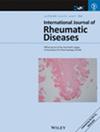Efficacy and Safety of Tocilizumab in Polymyalgia Rheumatica: A Systematic Review and Meta-Analysis
Abstract
Aims
No meta-analysis has holistically analyzed and summarized the efficacy and safety of tocilizumab in polymyalgia rheumatica (PMR). We undertook this meta-analysis to address this knowledge-gap.
Methods
Electronic databases were searched for RCTs involving patients living with PMR receiving tocilizumab in intervention arm, and placebo/active comparator in control arm. Primary outcome was to evaluate percentage of patients able to achieve C-reactive protein PMR assessment score (CRP-PMR-AS) < 10 or prednisolone dose < 5 mg/day or > 10 mg/dL decline in prednisolone from baseline. Secondary outcomes were to determine percentage of patients able to totally stop prednisolone and adverse-events.
Results
From initially screened 115 articles, data from 2 RCTs (136 patients) was analyzed. In addition, a descriptive analysis of 8 observational studies (356 patients) was also done. After 24-weeks of clinical use, patients with PMR receiving tocilizumab had significantly higher chances of achieving composite primary end-point defined as CRP-PMR-AS < 10 and either prednisone dosage < 5 mg/day or decrease in prednisolone dosage by > 10 mg/day compared to baseline [odds ratio (OR) 4.89 (95% CI: 2.34–10.23); p < 0.001; I2 = 0%], compared to placebo. Patients with PMR receiving tocilizumab also had significantly higher chances of being able to stop prednisolone compared to placebo [OR 4.45 (95% CI: 2.06–9.61); p < 0.001; I2 = 0%]. Occurrence of total adverse-events [risk ratio (RR) 1.24 (95% CI: 0.50–3.12); p = 0.64; I2 = 0%], adverse-events leading to treatment discontinuation [RR 0.45 (95% CI: 0.10–2.02); p = 0.29; I2 = 17%], and infections [RR 1.71 (95% CI: 0.83–3.52); p = 0.14; I2 = 6%] were comparable in patients receiving tocilizumab as compared to placebo. Observational studies have noted lung infections, neutropenia and increased cholesterol with tocilizumab use.
Conclusion
Tocilizumab is well tolerated and is effective for managing PMR. Tocilizumab is an effective glucocorticoid sparing agent in PMR.

 求助内容:
求助内容: 应助结果提醒方式:
应助结果提醒方式:


